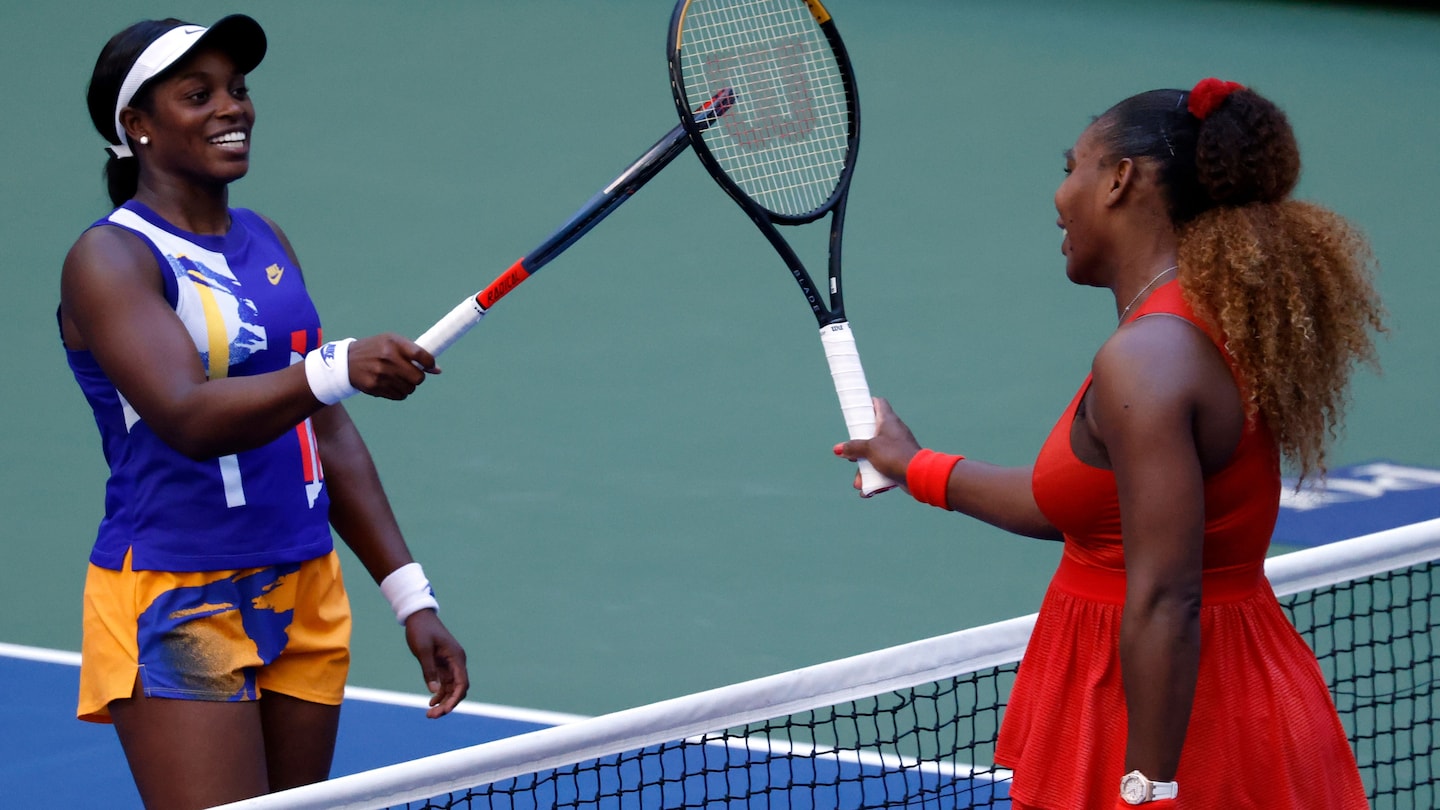Serena Williams finds a way to ‘be more serene’ and rally past Sloane Stephens at U.S. Open

“It’s so, so crazy because my daughter does the exact same thing,” Williams said. “I’m like, ‘Oh, my goodness.’ It’s just something that’s innate.”
At this stage in her life, Williams is discovering the key to success lies in finding room to allow for the occasional botched letter. That was certainly a crucial factor in her 2-6, 6-2, 6-2 win against Sloane Stephens on Saturday that felt much more like a semifinal than a third-round match.
A swath of Grand Slam champions, including Naomi Osaka, Petra Kvitova and Sofia Kenin, emerged from their player suites in Arthur Ashe Stadium to watch Saturday’s match. In a cavernous stadium nonetheless, Williams defeated Stephens, the 2017 champion in New York, for the sixth time to advance to the fourth round and keep alive her quest for a record-tying 24th Grand Slam singles title. She did it with levelheadedness even as it appeared Stephens would dictate the match after she won the first set in 39 minutes.
The 27-year-old used every tool in her extensive set at the start of the match, crafting points with precision, losing just six points on her serve in the first set and drawing Williams into long rallies that pulled her from side to side. Her defense made the court look small, and Williams suffered from sluggish footwork as she missed by inches lines that she usually clips. Playing to the edge of her potential, Stephens took an early break at 3-1 that gave her enough momentum to finish out the set.
But Williams stayed calm — no moaning or yelps of exasperation that have been commonplace as she works back into form after a five-month break from competition. She trusted her greatest weapon to carry her through and leaned into her serve, leaving Stephens with fewer chances to set up rallies to her liking.
“That’s my thing — just try to stay calm and be more serene,” Williams said.
In the first set, she won just 50 percent of points on her first serve; in the second, she won 76 percent. By the end of the match, Williams’s serves climbed to an average of more than 109 mph. She hit 12 aces and won 10 of the final 12 games.
Meanwhile, Stephens’s level dipped off the edge of a cliff.
“She served a lot better. Obviously she has one of the greatest serves in the game. It’s really difficult to read,” Stephens said. “Definitely something that I thought was a little bit trickier, but I just tried to get my racket on a lot of the balls and make her play as best I could.”
When Williams won and she let loose her biggest burst of emotion yet, her 3-year-old daughter, Olympia, waved while wearing a mask and sitting on her father’s lap from the stands.
“I hope,” Williams said on-court, “that she saw her mama fighting.”
In the fourth round Monday, Williams will face No. 15 seed Maria Sakkari for a spot in the quarterfinals. The savvy Greek defeated American teenager Amanda Anisimova, 6-3, 6-1, on Saturday for her first straight-sets win at the U.S. Open. Though Sakkari is a seasoned pro at 25, it will be just her second appearance in the fourth round of a major. Both came this year, however, as Sakkari reached the fourth round at January’s Australian Open.
Monday’s match will be a redo of the pair’s meeting last month at the Western & Southern Open, where Sakkari defeated Williams in three sets after the American grew so upset with herself after losing a winnable second set that she lost the match.
“You know, Serena is Serena,” Sakkari said with a smile Saturday. “You have to come up with some great tennis. Otherwise there is no chance against her.”
Great tennis and — if you ask Williams — a strong mind are both needed to win. She said as much Saturday, not just about staying calm on the court but about focusing on the match at hand with the prospect of tying Margaret Court’s record of 24 Grand Slam singles titles looming over every major she plays.
“Sometimes it’s harder than others. Every day having ‘Serena’ on your back is a massive target for the tour, for press, for stress,” Williams said. “But as Billie Jean King said, pressure is a privilege. So I wouldn’t want it any other way. I just try to think about how fortunate I am to have been in this position and, honestly, to be Serena.”
Read more:






